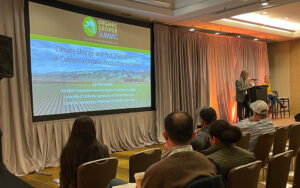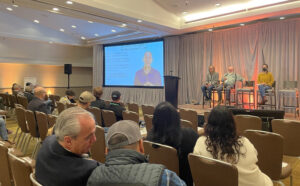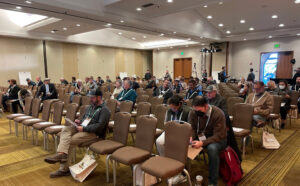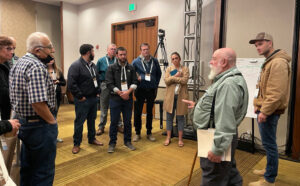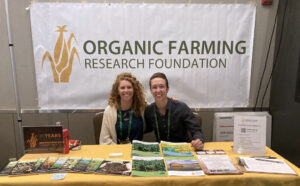By Haley Baron, OFRF Partnership & Development Manager
As the OFRF team walked into the large conference room filled with people at the 2021 Organic Grower Summit (OGS) in Monterey, CA last week, it was hard to believe we were actually there… in person! OGS is a gathering of organic farmers and industry professionals to share ideas and new techniques, and connect with our organic community. After canceling OGS 2020 and nearly two years since our last in-person event, we were excited (and a little nervous!) to finally be there. But, as our two-hour workshop, “Building Resilience through Organic Farming Systems” began, we quickly remembered the magic of being in conversation with growers about the principles and practices of organic farming systems that are critical to farmer resilience.
For our workshop we brought together three extremely knowledgeable experts to discuss the ways that climate change will affect growing conditions in California as well as the practices and research that can help growers adapt and become more resilient. The crowd of about 100 attendees were eager to learn, network, and ask questions.
The morning began with Joji Muramoto, the first and only Cooperative Extension Specialist fully focused on organic production in California and UCSC professor, who shared about the ways climate change will impact arthropod pests and plant diseases. Tom Willey, organic farming pioneer, spoke about the no-till organic trials he has been part of in recent years. The audience was eager to hear from Tom as he has been farming organically for four decades in Madera, CA. And lastly, we had Eric Brennan, USDA’s Agricultural Research Service (ARS) only organic-focused Research Horticulturist in the entire country, who joined us virtually with a perfectly-produced and research-filled video about climate change and soil health resilience strategies, such as cover cropping. His YouTube channel features a revised version of his video presentation, “Cover Cropping Strategy is for Climate-Smart Farmers and Climate-Resilient Farms.”
We concluded our workshop with informal discussion groups about the challenges, needs and opportunities that growers have in a variety of topic areas such as soil health management, pest, disease, and weeds.
Throughout the conference, our team had the pleasure of seeing old friends and partners face to face, and meeting many new ones. Thanks to the Organic Produce Network team for producing OGS and including us!




